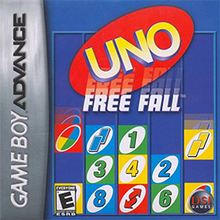
Dr. Mario is a 1990 puzzle video game developed and published by Nintendo for the Nintendo Entertainment System and Game Boy. It was produced by Gunpei Yokoi and designed by Takahiro Harada. The soundtrack was composed by Hirokazu Tanaka.
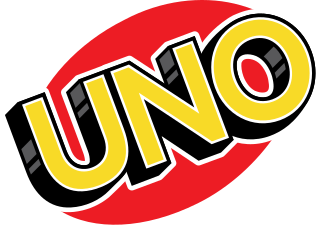
Uno, stylized as UNO, is a proprietary American shedding-type card game originally developed in 1971 by Merle Robbins in Reading, Ohio, a suburb of Cincinnati, that housed International Games Inc., a gaming company acquired by Mattel on January 23, 1992.

The Nintendo DS is a 32-bit foldable handheld game console produced by Nintendo, released globally across 2004 and 2005. The DS, an initialism for "Developers' System" or "Dual Screen", introduced distinctive new features to handheld games: two LCD screens working in tandem, a built-in microphone, and support for wireless connectivity. Both screens are encompassed within a clamshell design similar to the Game Boy Advance SP. The Nintendo DS also features the ability for multiple DS consoles to directly interact with each other over Wi-Fi within a short range without the need to connect to an existing wireless network. Alternatively, they could interact online using the now-defunct Nintendo Wi-Fi Connection service. Its main competitor was Sony's PlayStation Portable during the seventh generation of video game consoles.

Mario vs. Donkey Kong is a 2004 puzzle-platform game developed by Nintendo Software Technology and published by Nintendo for the Game Boy Advance. The game is the spiritual successor to Donkey Kong, which was released in 1994 for the Game Boy.

Kingdom Hearts: Chain of Memories is an action role-playing video game that was developed by Square Enix and Jupiter, and published by Square Enix in collaboration with Disney Interactive in 2004 for the Game Boy Advance (GBA). The game, which is an intermediary between the two larger-scale PlayStation 2 games in the Kingdom Hearts series, was one of the first GBA games to incorporate full motion video (FMV).

Puyo Pop Fever is a 2003 puzzle video game developed by Sonic Team and published by Sega. It is the fifth main installment in the Puyo Puyo puzzle game series and the second Puyo Puyo game to be programmed by Sonic Team after Puyo Pop. This was the start of what can be considered a reboot of the Puyo Puyo franchise, with this entry's plot revolving around Professor Accord losing her flying cane.

Mr. Driller Drill Spirits is a 2004 puzzle video game developed and published by Namco for the Nintendo DS. Controlling one of six characters, the player must make it to the bottom of each stage by destroying, colored formations of blocks while preventing their oxygen meter from depleting. Multiple different gamemodes are present, including a single-player campaign, a time-attack mode, and a competitive multiplayer mode. It is the sixth entry in the Mr. Driller series.
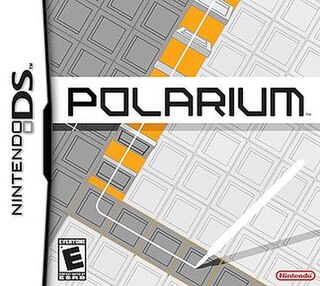
Polarium is a puzzle game developed by Mitchell Corporation and published by Nintendo for the Nintendo DS. It was a launch title in Japan, Europe and China. In the game, players use a stylus to draw lines on the DS's touch screen, flipping black and white tiles to clear puzzles.

Polarium Advance is a puzzle video game developed by Mitchell Corporation and published by Nintendo for the Game Boy Advance. Despite starting development before it, it is not a sequel to Polarium on the Nintendo DS. It was released in Japan in October 2005 and Europe in March 2006, with Atlus releasing it in North America in November 2006.
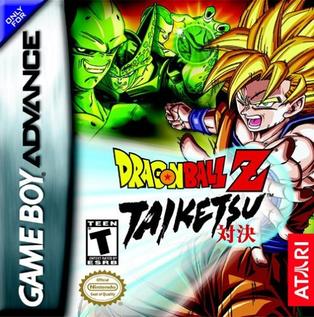
Dragon Ball Z: Taiketsu is a fighting game developed by Webfoot Technologies and published by Atari It was released on November 24, 2003 for the Game Boy Advance.
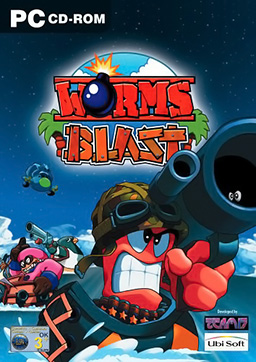
Worms Blast is a puzzle video game for Microsoft Windows, PlayStation 2, GameCube, Game Boy Advance and Mac OS X released in 2002, developed by Team17, and published by Ubi Soft. The Mac version was developed and published by Feral Interactive.

Flushed Away is an action-adventure video game based on the animated film of the same name and released in 2006 by Monkey Bar Games for GameCube, PlayStation 2, Game Boy Advance, and Nintendo DS. It was released in Japan for the Nintendo DS as Volume 17 of the Simple series.

Yu-Gi-Oh! Worldwide Edition: Stairway to the Destined Duel, later released in Japan as Yu-Gi-Oh! Duel Monsters International, is a Game Boy Advance game based on the popular Yu-Gi-Oh! trading card game and TV series that has the player set during the Battle City arc, dueling popular characters from the anime and manga. The main objective of the game is to build a strong deck from cards won after duels from the main cast from the English second season anime.
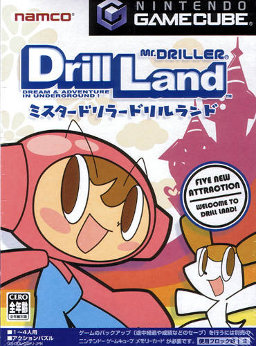
Mr. Driller Drill Land is a 2002 puzzle video game developed and published in Japan by Namco for the GameCube. It is the fifth entry in the Mr. Driller video game series, and the second developed for a Nintendo platform following Mr. Driller A. Controlling one of seven characters, the player must make it to the bottom of each stage by destroying colored blocks, which can connect to each other and form chain reactions. The game is divided into five different modes themed as amusement park attractions, which feature new mechanics such as enemies, items and different block types.

Uno is a video game based on the card game of the same name. It has been released for a number of platforms. The Xbox 360 version by Carbonated Games and Microsoft Game Studios was released on May 9, 2006, as a digital download via Xbox Live Arcade. A version for iPhone OS and iPod devices was released in 2008 by Gameloft. Gameloft released the PlayStation 3 version on October 1, 2009, and also released a version for WiiWare, Nintendo DSi via DSiWare, and PlayStation Portable. An updated version developed by Ubisoft Chengdu and published by Ubisoft was released for the PlayStation 4 and Xbox One in August 2016, Microsoft Windows in December 2016 and for the Nintendo Switch in November 2017.
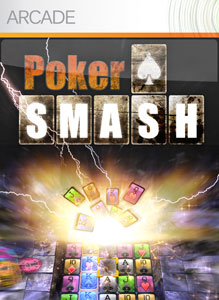
Poker Smash is a puzzle game developed by American independent software developer Void Star Creations for the Xbox 360's Xbox Live Arcade service and iPhone OS. The title was officially announced during Microsoft's E3 2007 press conference and was released on February 6, 2008. A Microsoft Windows release was announced for 2013, but never happened.

Rotohex is a Nintendo video game for the Wii's WiiWare service. It is a remake of the Japan-only bit Generations title Dialhex. It was released as WiiWare in North America on October 27, 2008.

The Elder Scrolls: Legends is a free-to-play digital collectible card video game, published by Bethesda Softworks for Microsoft Windows, iOS, macOS and Android in 2017.

The Harry Potter video games are a series of video games based on the Harry Potter novel and film series originally created by English author J. K. Rowling. Many of the Harry Potter-inspired video games are tie-ins to the film adaptations of the same name. There are multiple distinct versions for individual games.

Uno Flip! is an American shedding-type card game produced by Mattel. The cards from the deck are specially printed for the game. This game is a variation of Uno.
